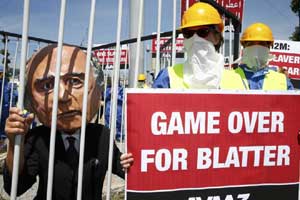Given how corrupt the Fédération Internationale de Football Association (FIFA)has been perceived for years now, the US Department of Justice (DoJ) unearthing graft involving $150 million for broadcasting and marketing rights for football tournaments in the Americas could be a game-changer for sports administration. Fourteen individuals—nine officials of FIFA and affiliated bodies and five businessmen—and two corporations have been charged with wire fraud, money-laundering and racketeering. Some of the 14 also face bribery charges over the selection of World Cup host-nations and clothing sponsorship contracts.
While the arrest of the corrupt officials has been welcomed by the fans of ‘the beautiful game’, the global football administrator needs a thorough clean-up; the probe found, for decades, graft was FIFA’s preferred way of conducting business. To start with, the role of Sepp Blatter, FIFA president since 1998, needs to be investigated. Whether or not Blatter was directly involved, the scale and the continued run of graft through his long tenure means he couldn’t have been blind to it. This could get easier now, as a few of those arrested have agreed to co-operate with the DoJ. Leading corporate partners of FIFA, like Visa Inc , calling for “sweeping changes” in the way the football administrator functions—Visa has hinted that it may reconsider its sponsorship deal, which runs until 2022, with the body—has also stepped up pressure on Blatter and his acolytes to step aside.
However, what is crucial to cleaning up FIFA—and in the process, setting a template for action against corrupt sports bodies—is US authorities managing to get their game right on the legal basis for prosecuting the accused, given only two of the 14 are US citizens. As Bloomberg View columnist Noah Feldman has pointed out, any hope of prosecution hinges on the provisions of the US’s Racketeer Influenced and Corrupt Organization Act applying. And that would depend on proving that the defendants committed the crimes in the US or that they violated US statutes that apply extra-territorially and that FIFA’s corruption was so systemic that it would qualify being likened to a criminal organisation. Though the indictment was based on a probe into graft at the Miami, Florida-based Concacaf, the governing body for football in North America, many of the crimes have been committed abroad without ostensibly harming US interests—for instance, Jack Warner of Trinidad and Tobago, formerly a FIFA vice-president and Concacaf president, sold his vote to South Africa for $10 million in its bid for hosting the 2010 World Cup.
The US crackdown, if it ends in a more transparent FIFA, holds important lessons for all countries wishing to clean up local and global sports administration. India, for instance, desperately needs to clean up the BCCI stables, especially in the light of the IPL-betting scandal. Taking a leaf from the DoJ’s book might just be what is needed.
For Updates Check Editorials and Columns; follow us on Facebook and Twitter


